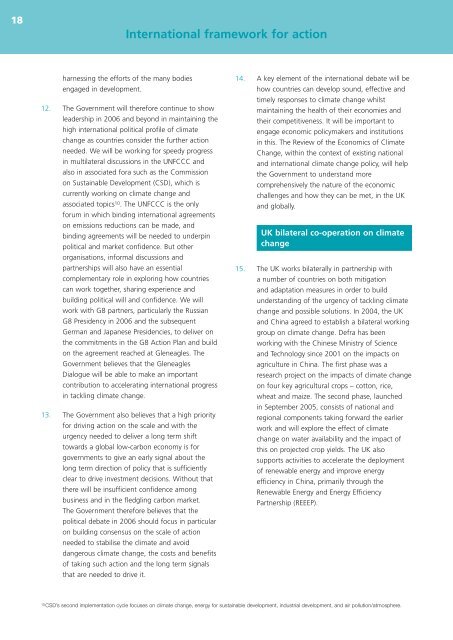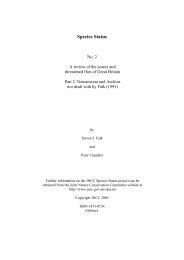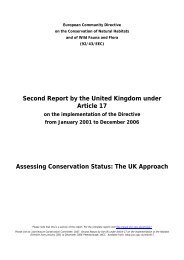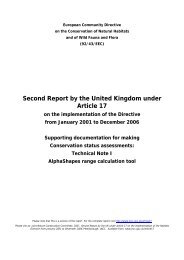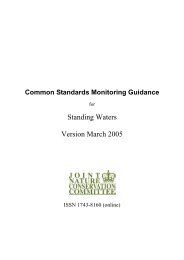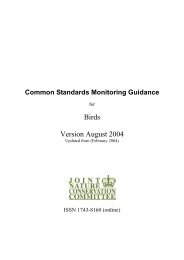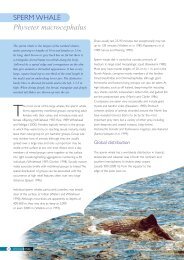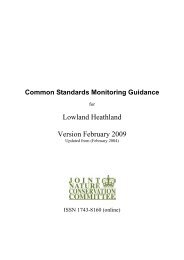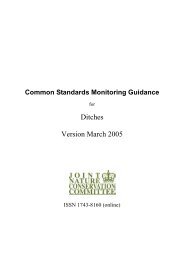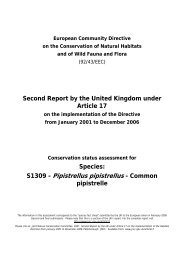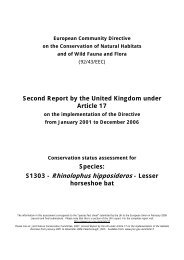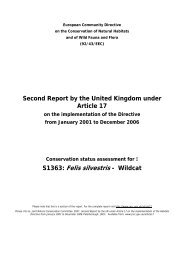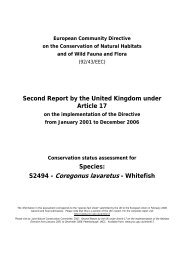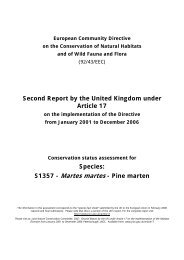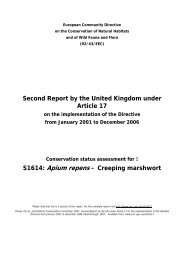UK Climate Change Programme 2006 - JNCC - Defra
UK Climate Change Programme 2006 - JNCC - Defra
UK Climate Change Programme 2006 - JNCC - Defra
Create successful ePaper yourself
Turn your PDF publications into a flip-book with our unique Google optimized e-Paper software.
18<br />
International framework for action<br />
harnessing the efforts of the many bodies<br />
engaged in development.<br />
12. The Government will therefore continue to show<br />
leadership in <strong>2006</strong> and beyond in maintaining the<br />
high international political profile of climate<br />
change as countries consider the further action<br />
needed. We will be working for speedy progress<br />
in multilateral discussions in the UNFCCC and<br />
also in associated fora such as the Commission<br />
on Sustainable Development (CSD), which is<br />
currently working on climate change and<br />
associated topics 10 . The UNFCCC is the only<br />
forum in which binding international agreements<br />
on emissions reductions can be made, and<br />
binding agreements will be needed to underpin<br />
political and market confidence. But other<br />
organisations, informal discussions and<br />
partnerships will also have an essential<br />
complementary role in exploring how countries<br />
can work together, sharing experience and<br />
building political will and confidence. We will<br />
work with G8 partners, particularly the Russian<br />
G8 Presidency in <strong>2006</strong> and the subsequent<br />
German and Japanese Presidencies, to deliver on<br />
the commitments in the G8 Action Plan and build<br />
on the agreement reached at Gleneagles. The<br />
Government believes that the Gleneagles<br />
Dialogue will be able to make an important<br />
contribution to accelerating international progress<br />
in tackling climate change.<br />
13. The Government also believes that a high priority<br />
for driving action on the scale and with the<br />
urgency needed to deliver a long term shift<br />
towards a global low-carbon economy is for<br />
governments to give an early signal about the<br />
long term direction of policy that is sufficiently<br />
clear to drive investment decisions. Without that<br />
there will be insufficient confidence among<br />
business and in the fledgling carbon market.<br />
The Government therefore believes that the<br />
political debate in <strong>2006</strong> should focus in particular<br />
on building consensus on the scale of action<br />
needed to stabilise the climate and avoid<br />
dangerous climate change, the costs and benefits<br />
of taking such action and the long term signals<br />
that are needed to drive it.<br />
14. A key element of the international debate will be<br />
how countries can develop sound, effective and<br />
timely responses to climate change whilst<br />
maintaining the health of their economies and<br />
their competitiveness. It will be important to<br />
engage economic policymakers and institutions<br />
in this. The Review of the Economics of <strong>Climate</strong><br />
<strong>Change</strong>, within the context of existing national<br />
and international climate change policy, will help<br />
the Government to understand more<br />
comprehensively the nature of the economic<br />
challenges and how they can be met, in the <strong>UK</strong><br />
and globally.<br />
<strong>UK</strong> bilateral co-operation on climate<br />
change<br />
15. The <strong>UK</strong> works bilaterally in partnership with<br />
a number of countries on both mitigation<br />
and adaptation measures in order to build<br />
understanding of the urgency of tackling climate<br />
change and possible solutions. In 2004, the <strong>UK</strong><br />
and China agreed to establish a bilateral working<br />
group on climate change. <strong>Defra</strong> has been<br />
working with the Chinese Ministry of Science<br />
and Technology since 2001 on the impacts on<br />
agriculture in China. The first phase was a<br />
research project on the impacts of climate change<br />
on four key agricultural crops – cotton, rice,<br />
wheat and maize. The second phase, launched<br />
in September 2005, consists of national and<br />
regional components taking forward the earlier<br />
work and will explore the effect of climate<br />
change on water availability and the impact of<br />
this on projected crop yields. The <strong>UK</strong> also<br />
supports activities to accelerate the deployment<br />
of renewable energy and improve energy<br />
efficiency in China, primarily through the<br />
Renewable Energy and Energy Efficiency<br />
Partnership (REEEP).<br />
10CSD’s second implementation cycle focuses on climate change, energy for sustainable development, industrial development, and air pollution/atmosphere.


